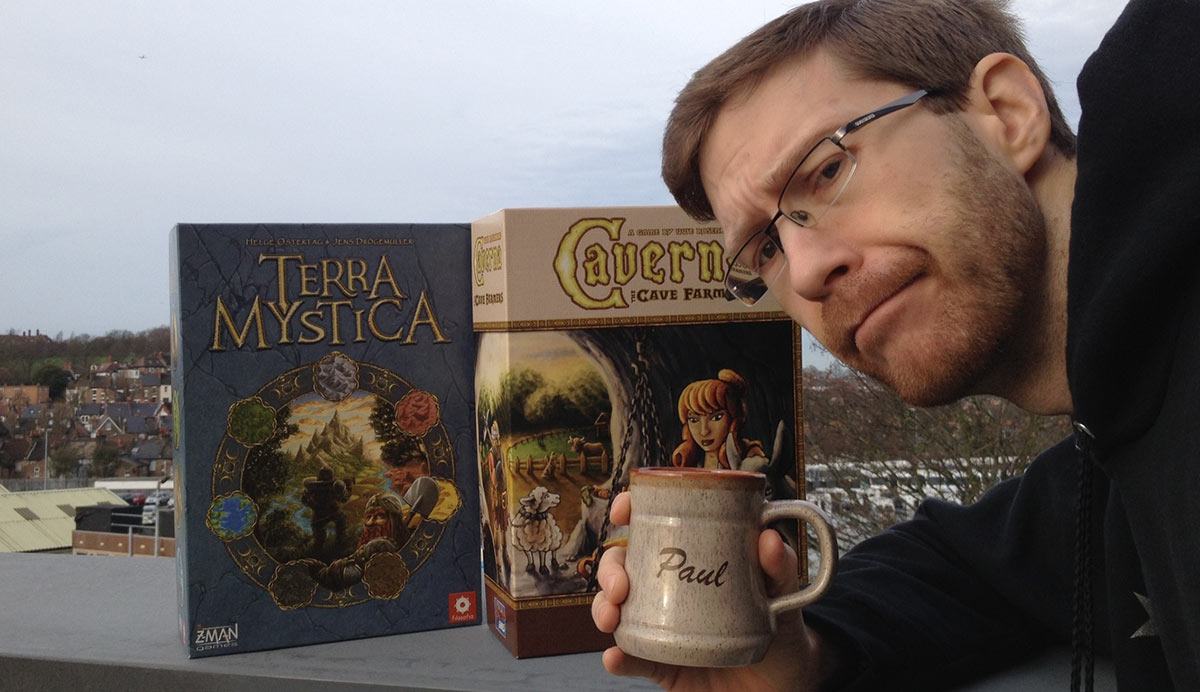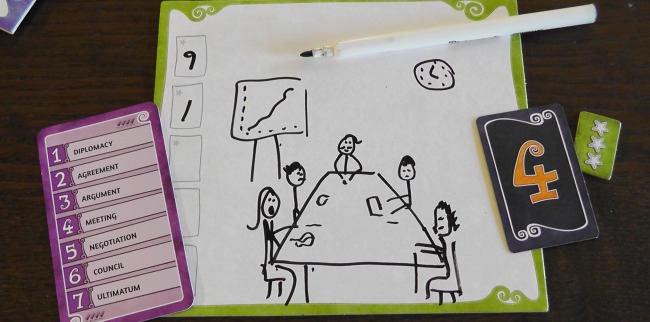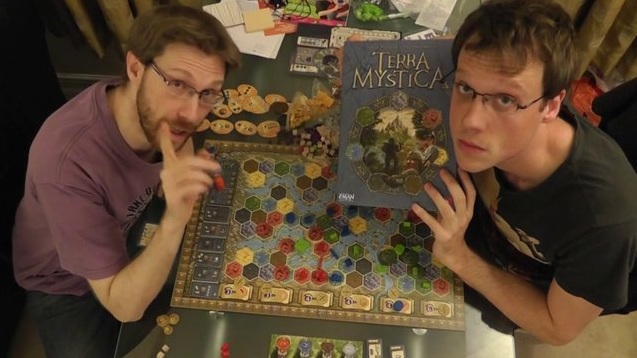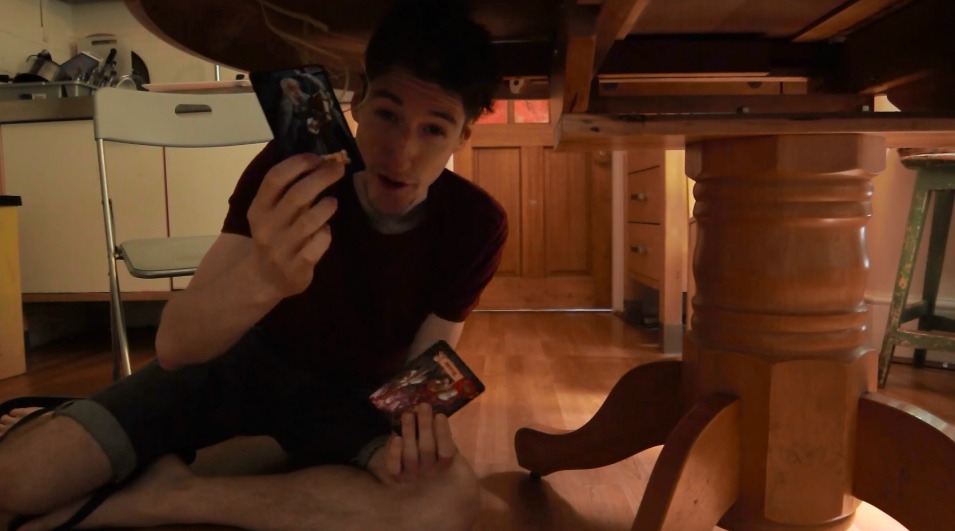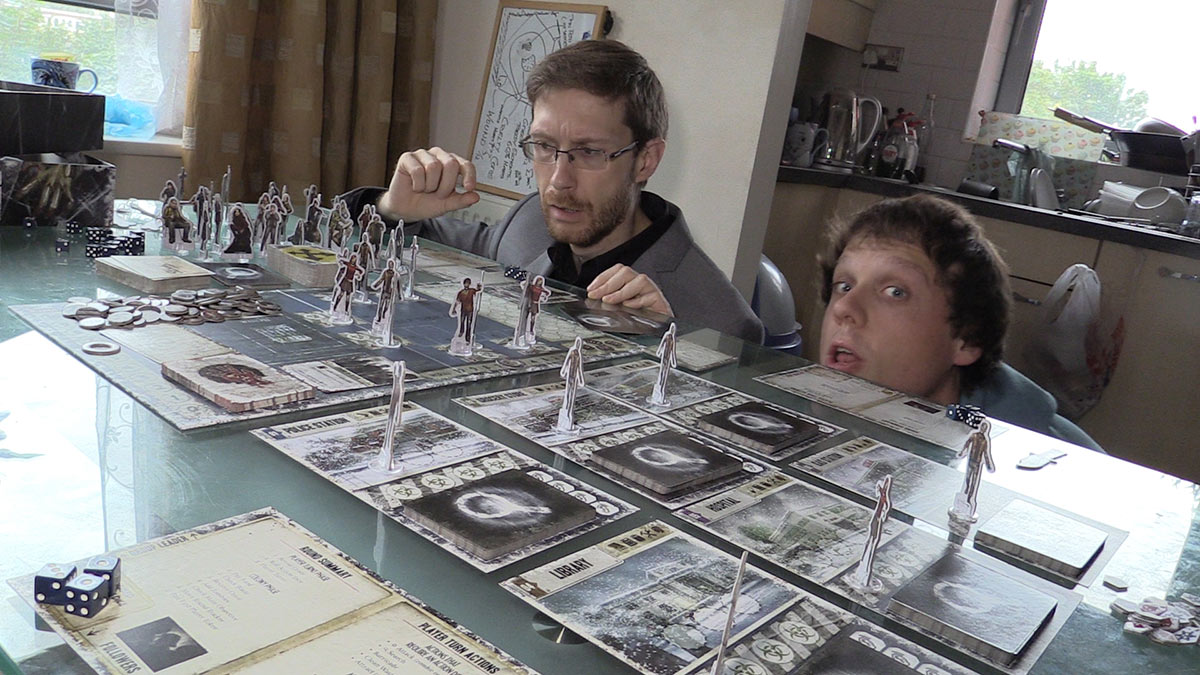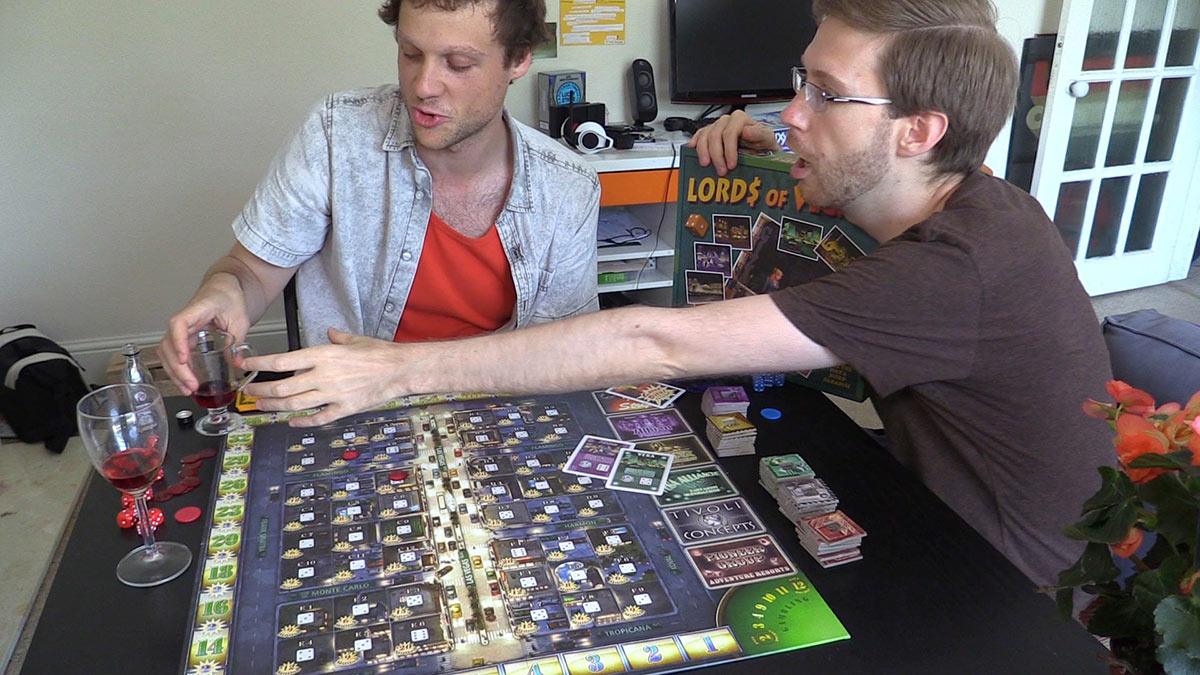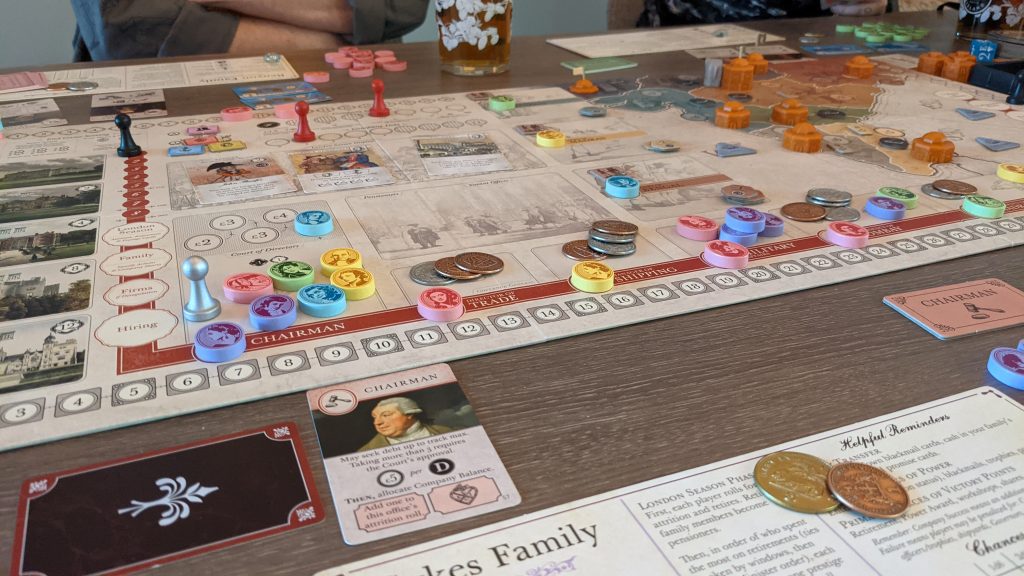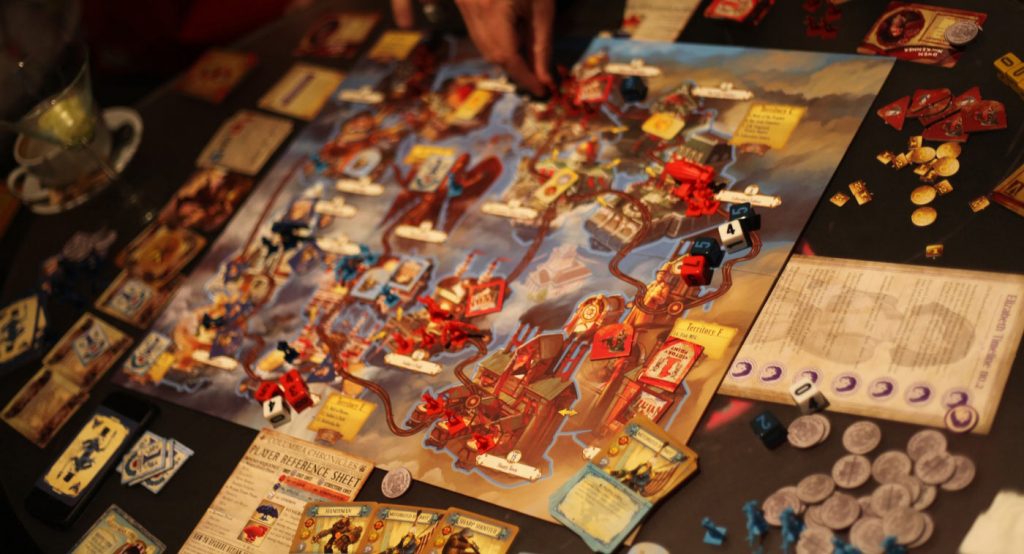Quinns: We’re back! Like a chicken rolling down a hill, SU&SD has started and won’t stop until we’ve reached the bottom of this mess.
Let’s see what golden games we’re squawking about today, eh?
#20: PICTOMANIA
Review here
Quinns: Yes, Pictomania. Did you think we were joking when we called it one of our favourite games of 2011? That it was a coincidence we kept mentioning it in 2012, 2013 and 2014? We’re as serious as as a dead chicken found at the bottom of a ravine when we say that this is one of our favourite games ever.
Ignore the rubbish name. Vlaada Chvátil’s Pictomania only masquerades as Pictionary so it can infiltrate more homes. Once it’s inside it starts openly fucking with you. What starts as you drawing a boot while your friend draws a goat rapidly evolves into you trying to draw “Eternity” while trying to guess what your friends are drawing, which will be tricky as they’re trying to draw “Gram”, “Reliability” and “Sociologist”. Mostly Pictomania is just a game of getting your friends stuttering and swearing like angry little engines on a frosty morning.
Best of all, you can stop complaining that it’s out of print. Czech Games are releasing a new print run next year!
Paul: That’s some of the best news in board gaming right now. I think there’s a lot of enjoyment to be had from various comedy drawing/interpretation games, but Pictomania is the best, and the best by far, much like gravity is the best way to keep your feet on the ground and infinitely better than using old gum, glue or an overcomplicated system of levers and pulleys.
Brendan: My favourite moment of Pictomania was trying to draw “Judas Iscariot”. I did a little stick figure with a Roman helmet giving another little stick figure with a beard a bunch of coins. I think I drew a kneeling, praying Jesus on his other side too. I was so proud of how well I had created what, in my mind, was a faithful reproduction of a religion textbook illustration. The scene of Gethsemane as depicted in some school book from my childhood. When the drawing round stopped, everyone around the table looked to my board and said “What?” I looked back at my own drawing and saw, with a stranger’s eyes, complete nonsense.
Quinns: Yeah, that’s what it’s about. Spending 7 seconds drawing Harry Potter and the Prisoner of Azkaban, producing something that looks like Sesame Street on acid, and then one of your friends going OH MY GOD and getting it right anyway. God bless this game.
#19: TERRA MYSTICA
Review here
Paul: Whenever we were asking board gamers what their current favourite thing was, Terra Mystica kept coming up. It kept coming up last year. It kept coming up this year. It kept coming up when I asked around at BGG Con. I haven’t played a game in a while and now I miss it. I particularly miss that cycling magic system because, oh my goodness, wasn’t that clever? And isn’t that what magic should be? It should be clever. When I think magic, I think clever.
Quinns: I like Terra Mystica because it’s clearly the work of a terrible genius, but what makes me love it is a trait it has in common with Dixit. It’s arcane enough to be a game you might watch people play in a Fantasy movie, probably with the protagonist’s soul at stake. “The Giants are creating mountains in the west, and the Mermaids have built a Fortress! Stop being stubborn, Gimli- you know my Alchemists and your Darklings must work together!
It’s absolutely ridiculous, and helped by that comparatively plain board. While art design in board games is getting better and better, I’ve got a soft spot for games that look like Terra Mystica. Lovely wood carvings scattered across a realm of beige.
It’s all so nice. This game has to be one of the nicest ways to lose an evening.
Brendan: Nope. This is the only game on the list that I actively dislike. Terra Mystica, to me, is the equivalent of sitting your friends around a giant sudoku and quietly chewing on your cheeks with rage while some small, uninteresting maths gets done.
Quinns: Not your cup of tea, then.
Brendan: It’s not my cup of ANYTHING.
Pip: I’m eavesdropping on this discussion and I heard “magic” and instantly was overcome with suspicion because so few games do magic well. And by “well” I mean “the way I like it”. Then I read down and found out that Brendan thought it was boring and there might be maths involved so I’m back to being interested.
I also think we should do a giant sudoku together. Or maybe I should do a giant sudoku together on my own. With a cup of tea.
Can I have a cup of tea?
Paul: Pip? Were you inside the Terra Mystica box this whole time?
Pip: It’s so warm!
#18: MASCARADE
The Opener here
Paul: Oh, I love hidden roles. I love hiding those roles and going “Where are you, roles?!” and then finding those roles in the cupboard or under the sink or burrowing their way into my cochlea. Mascarade does so many clever things with hidden roles, not only confusing you about who even you may be, but also giving you curious characters like the Peasants, who all get to combine forces. Or might just all be lying. Grr, peasants.
Matt: Leave the peasants alone Paul we’ve talked about this. You’ll have new axes to grind soon enough anyway – the expansion adds a necromancer and a graveyard full of potential characters and a man who gets you IMMEDIATELY KILLED if you ever have to reveal him.
Paul: I don’t want to be killed and that sounds awful.
Matt: I’m not sure I want to be killed either, and I don’t know how well knockouts would work in this fabulous hidden role game. I guess we’ll just have to wait and find out in an exciting future episode of The Opener(TM) – coming soon exclusively to Shut Up & Sit Down.
Paul: Stop trying to hawk your filthy wares and tell these fine people why the vanilla version is brilliant.
Matt: It’s brilliant because humans aren’t very good at memory. Get someone to swap two cards around a few times underneath a table, and chances are they’ll often lose track of which card is in which hand. When this happens, chances are that their face will suddenly light up with disappointment, causing the rest of the table to immediately burst into laughter. That’s the core of Mascarade, really – it’s a game where intel represents power, but intel is often brief and fleeting or sometimes simply downright wrong. Knowing what cards other players have in front of them is the key to winning in Mascarade, but more important than that is knowing which card you’ve got in front of you. You can always physically take a peek if you want to be sure, but doing that takes a turn. A whole turn!
So what you’re left with instead is a chain of assumptions. He had that card, then he swapped that card with him, then I took HIS card, so I must be the King. It’s a game where misinformation can be infectious – one round I played saw my girlfriend so convinced that she was the Queen that everyone else simply believed it too, leaving no-one challenging her right up until the point where it felt like doing so was a waste of time. She’s won anyway, we all agreed – but we might as well call it.
I think the beauty of Mascarade is that it isn’t just a straight bluffing game – even if you’re doing a perfect job of reading people’s faces and sussing their intentions, you can’t account for the possibility that someone might have simply messed things up. I’ve lost track of the number of times I’ve given another player the card I meant to keep simply because I’m an actual idiot. Keeping a straight face so that they don’t clock the mistake you’ve made is just another layer in this superb bluffing game.
#17: DEAD OF WINTER
Review here
Paul: A lot of games try to wind narrative around their mechanics or attempt to grind it in like spices in a sausage, but most of the time they just can’t get the taste right. Usually you just end up with a theme or concept which, at best, explains what you’re doing, while story actually driving a game generally remains the preserve of tabletop RPGs.
But Dead of Winter makes a beautiful bratwurst. There’s an enormous deck of cards that might potentially squeeze out a new slice of plot every turn, most of them written in a way that introduces their events so very naturally. That in itself is great. Then there’s all your hidden objectives that have you sort of helping out, but not always. Then there’s the race against time. Then there’s the constant search for food and fuel.
Quinns: Yep. I think what earns Dead of Winter, this wet-round-the-box newcomer, such a high place on our list is that it soaks up every important lessons of modern game design. It’s not just a story sausage, there’s a satisfying wad of mechanical mashed potato, all of it sopping with the sauce of hidden roles, adult stories, beautiful art and straightforward rules.
My only complaint is that it’s also yet another dollop of zombies onto our fatigued palettes. Then again, when you actually play Dead of Winter the zombies fade into the background, don’t they? You’re left thinking and talking about nothing but the game’s colourful human survivors.
Most exciting of all, it’s only the first game in Plaid Hat’s new “Crossroads” series, and whenever I’ve talked to the designers they’ve made the next ones sound way less generic.
Matt: For me it’s been that element that’s kept me on the fence about whether or not to get it – the sheer talent of the team behind Dead of Winter and the knowledge that they’re implementing a similar system of fragile alliances into newer games leaves me wondering if it’s worth holding off to see if the next one is the definitive Crossroads game.
I agree about the zombie theme feeling tired, but I liked that the real foe seemed to be a blend of madness and ice – a pressure cooker of stress that’s expertly reflected by the increasingly strained relationships between the actual players. Giving everyone their own weirdly specific task for each game makes it so much harder to pinpoint traitors, and thematically I love the way it reflects the grey reality of survival – this idea that losing the plot and getting obsessive about strange things isn’t just the reserve of those who’ve turned a bit evil. The tight links between mechanics and theme are what make Dead of Winter hot for me, linking all those hot sausages together in… that thing where all the sausages are linked together by the casing. What do you call that?
Quinns: Sausages.
#16: LORDS OF VEGAS
Review here
Podcast impressions here
Paul: Wait, I want Carcassonne to go here. That’s about laying tiles. Why can’t we have Lords of Carcassonne?
Quinns: We can’t start putting our lab-bred hybrid games on this list. Otherwise we’ll have to tell everyone about Two Night Ultimate Werewolf: Avalon and a Boom. Western society isn’t ready for that game yet.
Paul: You’re right. The Bestial Lust phase alone-
Quinns: Also, Carcassonne doesn’t let you goad your friends into visiting your casino to lose five million dollars at the craps table. Carcassonne’s a classic, inspired design. But Lords of Vegas is so much more SU&SD, isn’t it? Like Carcassonne it skirts perfection with this fantastic area control game with lots of risk/reward, except Lords of Vegas then keeps building, onward and upward. More jokes! More risk! More reward! The end result is like any other Las Vegas casino. Seductive, impressive and cheerily unfair.
Brendan: I like the way the banknotes aren’t in wimpy Monopoly denominations of tens, twenties or fifties, but in MILLIONS. And that they each have a different member of the Rat Pack on them instead of George Bush or whoever. This, folks, is how you do ‘play money’. It is just one of the tricks Lords of Vegas uses to make every player feel like a rich jerk. The way you have to finagle your way into owning as many neighbouring lots as possible (partly through luck, partly through shady deals with others) so you can make your gargantuan Ubercasino, really makes this game feel like it is exactly what is projected inside every property baron’s ego. Could only be improved by chomping on a big cigar while you roll the dice.
Matt: I adore the way that casinos go in and out of style, too. Watching one player make a killing on Western-themed casinos while another invests every penny they’ve got into Sci-fi just fits the gold-rush tone of the overall game perfectly. You can spend the whole game investing heavily into “the next big thing” only to find that the fad never happens, or you can suddenly become vastly wealthy when your long-term gamble finally pays off. Being a loser in Lords of Vegas is weirdly entertaining, simply because you get to act out that well-worn movie trope of the washed-up businessman who made a bad investment. Honestly, Sci-fi casinos are gonna be huge! It’ll happen, you’ll see. Can you lend me five million?
OOH, and I also love the way that you can make the extra dosh you need to finish off a purchase by playing craps at someone else’s casino. How many times in your life does the average person get to experience what it feels like to be blessed with the unfair odds of the house?
[For other instalments of our 2014 Top 25, here’s #25 to #21, #15 to #11, #10 to #6 and #5 to #1.]

